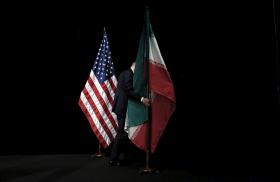
- Policy Analysis
- Articles & Op-Eds
Security Coordination: Between the Desire to End it and the Need to Continue It

April 8, 2016
Future relations between the Palestinians and the Israelis will likely be hamstrung by issues of the past. Namely, Israel continues to illegally occupy and support settlements in Palestinian territory, among other restrictive activities. As a result, the Palestinian Authority (PA) has warned Israel of its readiness to withdraw its commitment to the terms of their previous political agreements unless Tel Aviv recommits to the peace process.
A major consequence of deteriorating ties has been the PA’s reconsideration of its current security relationship with Israel. Most recently, the PA tasked its security agencies with determining whether Tel Aviv’s intransigence regarding the political process and Jewish settlements justifies halting security coordination with Israel. The re-examination stems from a landmark decision made by the PLO Central Council a year ago to transform the PA’s approach toward the Palestinians and put more pressure on Israel to modify its conflict resolution policies.
The PA has concluded that negotiations with Israel are feckless, even if a leftist government came to power, because the left and the right have become closer than ever before. Thus, the PA finds it better to end the coordination, despite knowing disintegration will not be easy since the PA is firmly embedded in and habituated to the present arrangement. Furthermore, such a move will make thinking about transitioning to a state more difficult.
Nevertheless, the PA seems intent on implementing its decision to end security coordination. This is based on several important strategic choices made by the PA to better manage the resolution of the conflict with Israel. The most important of these are building popular resistance on the ground, intensifying activities to internationalize the struggle and paving the way for an international conference to break the impasse, as per the French proposal. The PA considers all of these to be viable options that will lead to solutions.
Israeli views differ starkly. For Israel, no security coordination means no political process. Israel has long been predicting the demise of PA, asserting that the PA needs security coordination no less than Israel does and the PA is the one taking steps away from peace. Up until recently, Israel has intensified its talk about the demise of the PA, considering it just a matter of time before the government falls. The PA’s choice to end security coordination would mark the tragic end of the PA, as well as of Fatah. This is especially true because of the need for this coordination to continue both in order to keep the door open for the resumption of negotiations and prevent Israeli-Palestinian violence from further escalating.
Israel has a large stake in the PA remaining stable, at least for a while longer. If the PA were to collapse, deep political, economic and security repercussions await Israel, especially if it were to appear as the sole cause of the PA’s dissolution. However, Israel will have less of an interest if the global community perceives the PA to have caused its own fall – but this scenario is less probable.
If the PA chooses to end coordination, it would have to confront a serious weakening of its position, both vis-à-vis Israel and internationally. Or, the PA could choose to continue coordination with Israel for an additional set period of time, since it defended this coordination previously as “sacred” and that it would continue either under the pretext that it is desperately needed to preserve what the Palestinians have achieved or to give Israel another chance to get its head straight and return to the right path.
Dr. Adel Mohammed Ayesh Al-Astel is a Palestinian academic. This item was originally published on the Fikra website.
Fikra Forum


